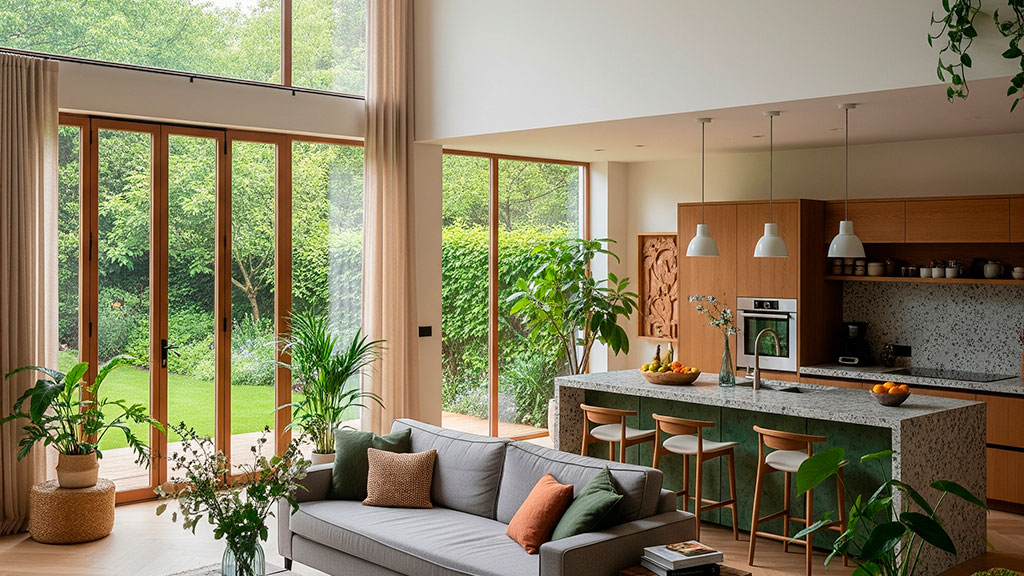In today’s world, global awareness about the importance of sustainability has transcended all areas of life, including luxury. Far from being opposing concepts, sustainability and a high-end lifestyle can coexist harmoniously, demonstrating that opulence doesn’t have to be at odds with environmental responsibility. Incorporating eco-friendly practices into the luxury home not only contributes to planetary protection but can also improve the efficiency, health, and well-being of its inhabitants, while adding intrinsic value and ethical distinction. At Luxury Philippines Domestic Services Agency Malta, we understand that our clients seek not only exceptional service but also an approach that reflects their values in an increasingly conscious world.
Energy efficiency and responsible consumption: pillars of the green home
Intelligent energy management is one of the fundamental pillars for a sustainable luxury home. Small changes and large investments can make a significant difference in the carbon footprint and resource consumption.
Optimizing lighting and HVAC
Transitioning to LED lighting is an essential step, as it consumes considerably less energy and has a longer lifespan. Complementing this with smart lighting systems that automatically adjust to natural light or presence maximizes efficiency. For climate control, installing smart thermostats and zoning systems allows precise temperature control, preventing waste in unused areas. Good thermal insulation in walls, ceilings, and windows is also crucial for maintaining stable temperatures with less energy expenditure.
High-efficiency appliances and renewable energies
Choosing appliances with the highest energy rating (A+++) is a smart investment that reduces electricity and water consumption in the long run. Furthermore, for homes looking to go a step further, integrating renewable energy sources like photovoltaic solar panels or geothermal systems can drastically reduce reliance on the grid and carbon emissions, positioning the home at the forefront of sustainability.
Intelligent water management
Water is a precious resource. Implementing low-flow faucets and showers, dual-flush toilets, and rainwater harvesting systems for garden irrigation are simple but effective practices. Installing drip irrigation systems in gardens and landscaping also minimizes water waste, ensuring every drop is used efficiently.
Waste management and circular economy: reducing impact
A sustainable luxury home not only consumes efficiently but also manages its waste with a circular economy mindset, aiming to reduce, reuse, and recycle as much as possible.
Advanced recycling and composting programs
Establishing a comprehensive recycling system that separates not only paper, plastic, and glass but also metals, batteries, and electronic devices is fundamental. For organic waste, composting is an excellent option that converts food scraps and garden waste into rich plant fertilizer, closing the nutrient loop and reducing the amount of trash sent to landfills.
Reducing single-use plastic consumption
Eliminating single-use plastics is a challenge but an achievable goal in a luxury home. This involves using reusable water bottles, cloth shopping bags, glass containers for food storage, and opting for bulk products whenever possible. Encouraging the use of refillable dispensers for soaps and detergents also contributes to this reduction.
Eco-friendly products and conscious consumption: the choice of responsible luxury
Sustainability extends to daily product choices and conscious consumption, where quality, durability, and ethical sourcing are as important as environmental impact.
Eco-friendly cleaning and personal care products
Opting for biodegradable cleaning and personal care products, free from harsh chemicals and with ecological certifications, protects the health of household inhabitants and staff, while preventing water pollution. These products are often just as effective and frequently come from sustainable sources.
Sustainably sourced furniture and decor
When furnishing or redecorating, choosing pieces made from recycled, reclaimed, or sustainably sourced materials (like FSC-certified wood) is a key practice. Supporting local artisans or companies with ethical and transparent practices also contributes to a more responsible supply chain and a reduction in carbon footprint associated with transport.
Local and seasonal foods
Prioritizing the purchase of organic, seasonal, and locally sourced foods not only guarantees freshness and quality but also reduces the carbon footprint associated with transport and supports the local economy. Menu planning and inventory management also minimize food waste, a significant problem in the global food chain.
Conclusion
At Luxury Philippines Domestic Services Agency Malta, we recognize that sustainability in the luxury home is an expression of a conscious and sophisticated lifestyle. Our professionals are trained to implement and maintain these eco-friendly practices, from efficient resource management to responsible product selection. By integrating sustainability into domestic service, our clients not only enjoy an impeccable and efficient home but also actively contribute to a greener and more responsible future. Luxury, when combined with sustainability, becomes a declaration of values and a legacy for future generations, demonstrating that living well and living responsibly are, indeed, one and the same.

